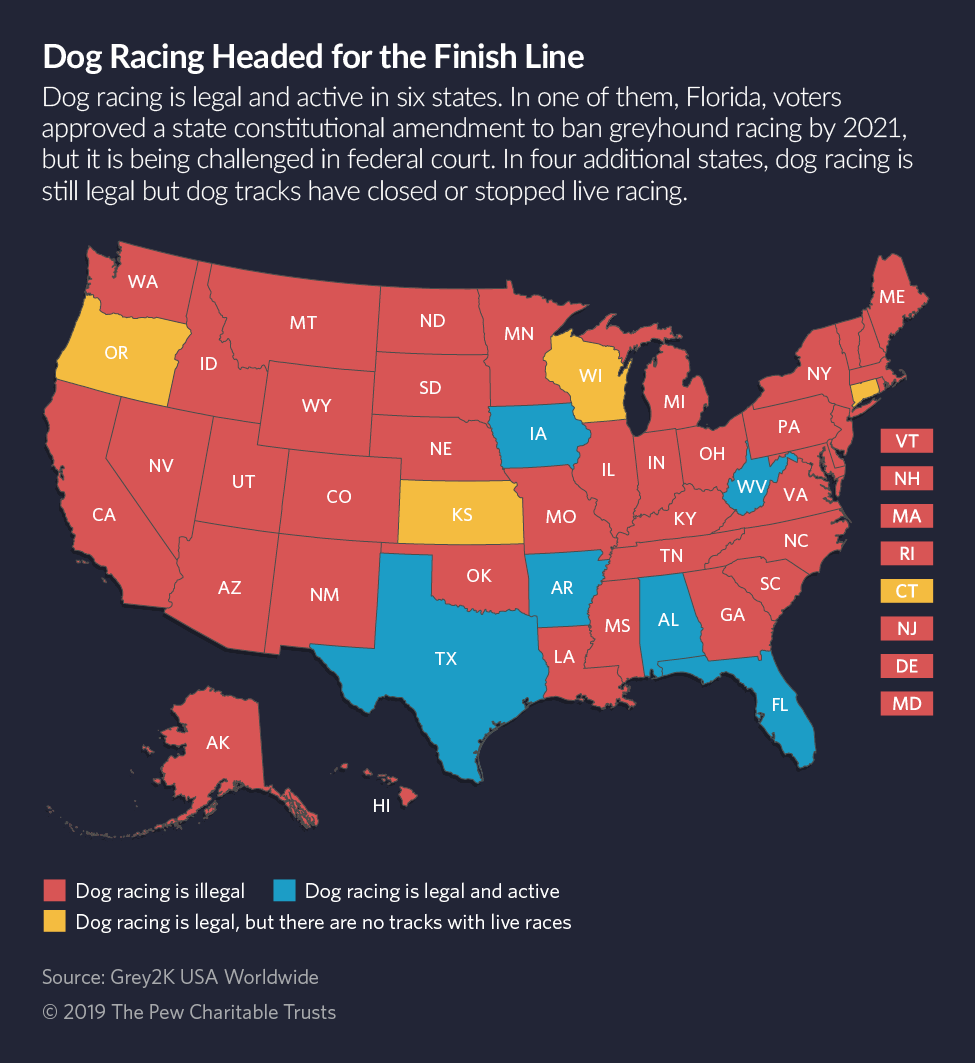Connecting state and local government leaders
Once legal in 19 states, greyhound racing happens only in six.
This article originally appeared on Stateline, an initiative of the Pew Charitable Trusts.
Rick Bartley once raced the greyhounds he breeds in Kansas all over the country, but the past decade has slowly stripped him of his livelihood. As state laws and attitudes toward commercial greyhound racing have shifted, fewer and fewer race tracks are open for business.
Earlier this month, Bartley learned that after 63 years, Southland Casino Racing in West Memphis, Arkansas — “the best track,” he said — plans to phase out greyhound racing too.
“It’s sad over at our house,” the 67-year-old said during a recent phone interview from his 42-acre dog farm in Abilene, Kansas.
Greyhound racing, once legal in 19 states, used to be among the most popular sporting activities in the country, but it’s gradually declined since the 1990s. States have steadily phased out the races in response to the concerns of animal welfare activists, declining public interest and changes in the entertainment business and gambling.
Now, greyhound racing remains legal in 10 states but takes place in only six. West Virginia has two dog tracks, while Alabama, Iowa and Texas have a single track each, and state-facilitated subsidies in Iowa are set to expire by Jan. 1, 2022.
While tracks remain active in Florida, voters passed a constitutional amendment last November to phase out commercial greyhound racing by 2021. And the West Memphis casino and Arkansas Greyhound Kennel Association agreed to phase out racing by 2023.
“With the Florida vote, and with the Arkansas decision, it’s now clear that greyhound racing is going to completely end in the United States,” said Carey Theil, executive director of GREY2K USA, an Arlington, Massachusetts-based advocacy organization that’s led efforts across the country to wind down the industry.

Over more than a decade, animal welfare groups have framed greyhound racing as a dying industry propped up by state subsidies, and shined a light on animal mistreatment, including the lack of homes available to an overpopulation of dogs after their racing careers.
But industry supporters argue that the dogs are cared for; bad actors are thrown out by the National Greyhound Association, the standards-setting body; and allegations of abuse are investigated by local authorities.
Much of the debate hinges on how people feel about animals, according to Gwyneth Anne Thayer, author of “Going to the Dogs: Greyhound Racing, Animal Activism, and American Popular Culture.” Rural farm culture often takes a more utilitarian view of animals. While many Americans think of dogs only as pets, the industry considers them working animals.
“I think people in cities and urban areas are thinking about their vegan lunch,” Thayer said. “It’s just a very different mindset. They’re just in a very different world.”
Abilene, the self-proclaimed “Greyhound Capital of the World,” is home to the National Greyhound Association, a nonprofit registry started in the early 20th century, and the 22,000-square-foot Greyhound Hall of Fame. Local racing retirees Ginger, 9, and Gary, 12, greet guests in the lobby.
“This is a tribute to the history, the pioneering spirit of the people who moved here in the 1800s and brought their greyhounds, and the farmers who imported their own greyhounds, second-, third-generation greyhound farms,” Director Kathryn Lounsbury said. “It just evolved in this area.”
Local families like the Bartleys have raised greyhounds for generations. Some hire people in the community to help feed and exercise the dogs and clean out their pens.
Bartley planned to turn over his business and farm to his three children, all in their mid-30s. They’re among the youngest members of the National Greyhound Association. Bartley started his career at age 14, alongside his parents and two sisters. He and his peers grew up in the business together.
“They got their kids educated and kicked them out of the house and got them out of the business,” Bartley said, “but I didn’t think it would go this fast.”
‘Economics, It’s Complicated’
In 1931, Florida became the first state to legalize wagering on greyhound races. The sport often intersected with popular culture there, as movie stars, baseball players and other celebrities frequented Florida tracks.
But the cost of regulating greyhound racing exceeds the revenue it generates, according to a 2013 independent study commissioned by the legislature. Florida has been losing between $1 million and $3.3 million a year.
State tax revenue from greyhound racing declined from $77.2 million in fiscal 1985 to $3.7 million in fiscal 2012, a 95% reduction.
In addition, the study found Florida’s greyhound tracks sustained a combined operating loss of $35 million in 2012. Three of the 13 tracks that year made a profit from wagering on greyhounds. The tracks’ cardrooms, where visitors gamble over card games, offset the combined operating loss with operating profits of $39 million.
Greyhound racing has produced fewer tax dollars for states as public interest has declined in Florida and other states. Meanwhile, other forms of gambling have increased in popularity.
“I think it’s important to keep in mind that the industry has shrunk so much that the economic impact, just in general — to rural communities, to states, to state governments — is just a shadow of what it once was,” said Theil of the anti-racing group. “I would argue it’s virtually nonexistent at this point.”
Not so for Bartley and other families who relied on money they made racing dogs at Florida tracks.
“When people criticize dog racing and say, ‘Get rid of it,’ they’re not thinking about these people,” said Thayer, the author of “Going to the Dogs.” “Economics, it’s complicated. You can’t just say, ‘Go find another job.’ What industry is out there in Kansas? It really will uproot these lives.”
Advocacy group Support Working Animals Inc., alongside several kennels, greyhound owners and industry enthusiasts, argue in a federal lawsuit that the amendment “escaped the checks and balances that are traditionally afforded to proposed legislation.”
No due process was afforded those who are most affected, the groups argue. In addition, they say, the law elevates animal welfare even though Florida statutes and case law have regarded animals as personal property. They are asking a federal judge to strike the law down.
“The dogs themselves, they love to run,” said Sharon Dippel, a plaintiff who runs a greyhound adoption agency. “There’s nothing that makes them more happier than getting on that track.”
But Lee, the measure’s sponsor, said many track operators wanted out too. Those in urban areas wanted to continue operating their slot machines and cardrooms but sell off tracks to pursue real estate and other investments. Now, some of the horse racing operators want to follow suit, Lee said.
It’s easy to kill a bill in the Florida legislature, Lee added, but the commission is not as susceptible to lobbying from special interest groups.
Earlier this year, a greyhound kennel owner in Pinellas County argued in a separate lawsuit in state court that the new law is an unconstitutional “taking” of property because his dogs are now worthless.
‘Born Runners’
In four states — Connecticut, Kansas, Oregon and Wisconsin — greyhound racing remains legal, but no tracks are operational.
In Iowa, state lawmakers struck a deal to split dog racing from two casinos as long as the casinos made payouts to the Iowa Greyhound Association. State law in Iowa, Florida and elsewhere required tracks to hold a certain number of live races each year and tied racing to other forms of gambling to keep their gambling license.
The next battleground is West Virginia. The state has two active greyhound racing tracks, in Charleston and Wheeling. Both tracks are operated by food service and hospitality company Delaware North, which also operates Southland Casino Racing in Arkansas.
In 2017, Republican West Virginia Gov. Jim Justice vetoed a bill sponsored by four Republican lawmakers that would have eliminated greyhound racing in the state by separating casinos from race tracks and ending annual subsidies worth $15 million gleaned from state lottery money. Both chambers passed the bill with bipartisan support.
In a statement following the veto, Justice called the legislation a “job killer” that would “drive more people out of West Virginia” and jeopardize the health of the state’s casino industry.
“Greyhounds are born runners,” Justice said, “and I hope to keep them running in West Virginia for a very long time.”
In September, Republican state Senate President Mitch Carmichael wrote a column published by the West Virginia Press Association calling for an end to state subsidies for greyhound racing. Carmichael told Stateline racing is inhumane, and using the money for water sewer projects, the treatment of opioid addiction and infrastructure projects would better stimulate job creation.
“If an industry cannot exist on its own without a government subsidy, then really what is the economic benefit?” Carmichael said. “What is the private sector advantage to a business that must be propped up by taxpayers?”
Carmichael, who’s also lieutenant governor, plans to introduce a bill during the next legislative session to phase out racing and separate it from the casinos. He aims to get the bill passed early in the session and noted that gubernatorial vetoes can be overridden by a simple majority while the legislature is still in session.
But having West Virginia in play gives Bartley hope in the short term.
“I guess our run’s about over,” he said, “but if West Virginia stays in action, we may get another six to eight years out of the business, maybe.”
April Simpson is a staff writer for Stateline.

NEXT STORY: Officials in One State Want a Process to Oust County Officials Accused of Wrongdoing



